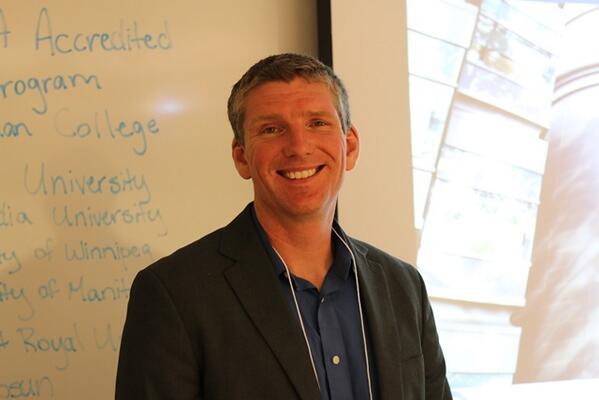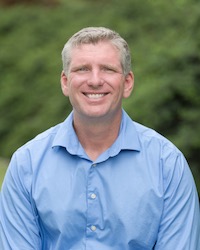Ask Away! Blog Series with Dr. Depp


Welcome to our Ask Away! blog series, where we explore the remarkable journeys of faculty, staff, and researchers at UC San Diego's Altman Clinical and Translational Research Institute (ACTRI).
Today, we are excited to introduce Dr. Colin Depp, the Director of Research Education and Training at ACTRI. With a deep commitment to advancing mental health research, Dr. Depp has made groundbreaking contributions to technology-based interventions for serious mental illnesses such as schizophrenia and bipolar disorder. His work spans interdisciplinary collaborations, behavioral health innovations, and mentorship of the next generation of clinical scientists.
In our interview, Dr. Depp shares his path from an early interest in psychology to becoming a leader in mental health research. Join us as we dive into his experiences, challenges, and vision for the future of clinical psychology and mental health interventions.
Can you share what initially sparked your interest in clinical psychology and how you became involved in mental health research, particularly in serious mental illnesses?
Yes! So when I was in college I started off thinking of a business career, but I found that psychology courses were much more interesting to me than economics. I started to volunteer to gain more experience, and I worked at a community agency that provided crisis services and emergency housing. After that I was hooked, as I was really impressed with the determination and resilience of the people that I had the opportunity to support. Then my focus turned to thinking about what I could do to create an impact. I found I really liked working with people with schizophrenia or bipolar disorder, and I found the lack of research in some areas were compelling gaps that I could work on. So, after that, I pursued training in clinical psychology and here I am!
Your research focuses on technology-based interventions for mental health. How do you see the role of mobile technology evolving in the treatment of serious mental illnesses?
I think my goal has always been to figure out how we can maximize the limited amount of resources allotted to care for serious mental illness. I think mobile phones can help bridge periods when people are not receiving care, and I also think that mobile tools for staying on track with recovery goals and translating things learned in treatments to everyday life could really help. As a field now, there are many research based solutions to using digital health for mental health, but we still have not identified fully how these solutions can be integrated into routine clinical care. This is a translational problem and so that is also why I like learning from the experts at ACTRI.
As the Director of Research Education and Training at the Altman Clinical and Translational Research Institute (ACTRI), what do you find most rewarding about mentoring the next generation of clinical scientists?
One of things about working at UCSD is that it is exceptionally easy to find people who are smarter than I am. We have this amazing bounty of smart people in clinical and research training programs, and I have found it exceptionally rewarding to help mentees figure out their path to their career goals. It is wonderful to see how successful they have become, and I am humbled to be a small part of their success stories. I also learn a tremendous amount from their research and clinical ideas, and so in many ways I am a mentee to them!
You’ve led several projects that combine behavioral interventions and technology to modify physical activity, sleep, and aging-in-place. What are some of the biggest challenges and opportunities in this area of research?
I think some of the most exciting work is in how we can truly individualize digital health approaches to create lasting behavior change, identifying what is unique about circumstances, motivations, and so on about each individual and tailoring interventions to them. I also think that advances in AI are getting closer to creating virtual or digital coaches that are eerily similar to humans. The great challenges of course have to do with how we can best utilize these innovations in real-world settings, and how vulnerable and marginalized people are included in every step in innovation so that new treatments are designed for them.
Given your work with interdisciplinary teams, how important do you think collaboration between clinicians, engineers, and bioinformaticians is for the future of mental health interventions?
Yes and I think that UCSD is ideal for interdisciplinary research and all sorts of other efforts. I think that there are so many amazing innovations being developed that are seeking a clinical application. Programs that involve clinicians and people with lived experience of mental health problems in the innovation process, from the very beginning, are very exciting to me. In practice it is also fun and a big challenge to learn how others think and communicate about science, so I have learned that interdisciplinary work requires a lot of patience and willingness to rethink my assumptions and worldview.
You’ve also developed training opportunities in medical device entrepreneurship. What advice would you give to young scientists or researchers interested in the entrepreneurial side of clinical research?
That is a great question - I think UCSD has a ton of programs, support, and advice for innovators and so my first piece of advice is ask for help and don’t try to do it alone! The process of taking a scientific innovation to a product is very challenging and for medical products, requires a deep understanding of the health system and regulatory environment surrounding the invention. So as early as possible, try to learn from experts, patients, clinicians, regulatory, billing and administrative leaders what barriers exist to translation.
As someone who mentors residents, fellows, and graduate students, what key advice do you give to those looking to balance clinical practice with research?
Being a clinician scientist is deeply rewarding and increasingly challenging - for example, the number of physicians who are engaged in science has been dwindling for years. My best advice here is to seek “near peer” mentorship from people who have successfully navigated setting up research and clinical operations that are synergistic. I also think that choosing environments that are supportive of clinician scientists is critical, so interviewing your “bosses” is often critical to make sure that you are part of a team of people advocating for and protecting clinician scientist carer paths.
With such a multifaceted role in research, education, and clinical work, how do you maintain a healthy work-life balance? Are there any specific habits or routines that help you unwind?
Great question - I may not be the perfect example of this - but I do have rules of thumb in work life balance. I don’t check email until I get to work, and I do focus on hobbies like guitar to make sure I have interests outside of work. My wife, 2 children and 2 dogs don’t really let me work at home, so that helps too!
Your work also focuses on aging and mental health, particularly in individuals with bipolar disorder. What are some of the most significant findings from your research in this area?
I think there are some positive findings, including that many older people with serious mental illnesses are exceptionally resilient and have experienced improvements in their illness. On the other hand, our group has contributed to understanding of the cognitive impairments that accompany these illnesses, which interfere engaging in habits that sustain wellness like functional tasks. We have also highlighted that, across the lifespan, suicide prevention is a major gap in supporting people with serious mental illness and we have developed suicide-specific interventions adapted to this group.
What advice would you give to students or individuals interested in pursuing a career in clinical psychology and mental health research, particularly in areas involving technology and interdisciplinary collaboration?
Here is the piece of advice I provide most often. There are many “hoops” and decisions to make along the way as far as which profession to choose or whether or not pursue research. I always suggest trying to choose paths that are consistent with one’s values and driving passions, rather than avoiding negative outcomes (e.g, like worrying about not getting research funded). I also recommend working on identifying a driving set of contributions that one is focused on, and mastering a “niche” where ideas and innovations become your impact vis a vis your “intellectual property”. It is tough to figure out at any career stage what to do next, and those guidelines have helped me along the way.
--
We thank Dr. Depp for his time and insightful contributions to this interview, offering a deeper understanding of his inspiring journey and innovative work in mental health research and clinical psychology. If you have any additional questions for Dr. Depp, don’t hesitate to reach out to us at researchcomm@health.ucsd.edu or v3chavez@health.ucsd.edu.
ACTRI Communications